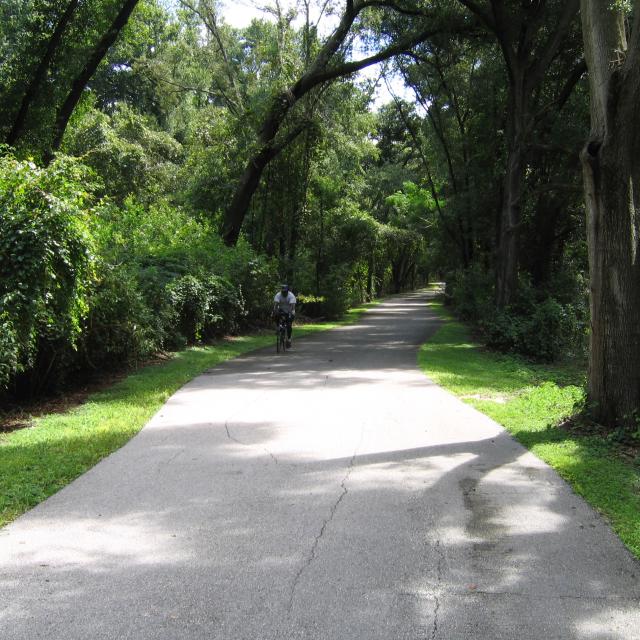Orlando: A Sustainable Destination
Orlando is a destination where dreams come true — and our dreams include a sustainable future. Here, eco-friendly practices are a priority. It’s why we’re ranked as one of the greenest cities in America by WalletHub, a top city for urban farming and voluntourism, and one of only five cities awarded the Smart City Council Readiness Challenge grant in 2017.
From venues and businesses, golf resorts, and LEED-certified lodging, to restaurants, activities and theme park conservation efforts, Orlando prides itself on being environmentally responsible. See how our local government agencies, businesses and residents are working together to make the Theme Park Capital of the World the most sustainable and resilient community in the Southeast.
Not just for our benefit and that of our shared planet — but for you and your family, too.
-
Orlando’s theme parks are more than unforgettable places to visit. They’re also helping Orlando achieve its dream of a sustainable future.
 Universal Volcano Bay at Universal Orlando Resort
Universal Volcano Bay at Universal Orlando ResortUniversal Orlando Resort annually recycles 10,000 tons of food waste, cardboard, metal, glass, plastic and paper. LED fixtures have also been incorporated throughout the parks. It has committed to using alternative fuels in 100% of its service vehicles and mobile equipment, too, resulting in 260 fewer tons of carbon dioxide emissions.
Save on discount tickets: Universal Orlando Resort
SeaWorld® Orlando offers recycled fiber napkins, compostable soda cups, and biodegradable, vegetable-based inks. It also eliminated plastic straws and bags, and recycles about half of its waste. The park even employs certified sustainable seafood and “Rainforest Alliance-approved” coffee.
Save on discount tickets: SeaWorld Orlando
In 2017, Walt Disney World® Resort reduced its new emissions by 41%. Currently, its solar facility uses over 500,000 solar panels that can effectively power two of the four theme parks. The company opened a new Mickey-shaped solar farm in 2019 that spans 270 acres. In addition, Walt Disney World now exclusively offers paper straws instead of plastic, single-use straws.
Save on discount tickets: WALT DISNEY WORLD Resort
-
Have fun while being green at these unique activities throughout Orlando.
Learn more: Orlando Attractions
Our Planet Exhibit at Orlando Science CenterOrlando Science Center
Part of Loch Haven Park north of downtown Orlando, Orlando Science Center is the first nonprofit in Florida to be LEED Gold certified and was the first building in Orlando to be LEED Gold under the Existing Buildings and Operations Maintenance Standards. A roof equipped completely with LED lights along with exhibits that actively promote the real-world benefits of renewable energy and conservation make the center an asset to an environmentally conscious community.
Showcase of Citrus
An antique farm store with a you-pick grove offering 50 varieties of citrus, Showcase of Citrus is in Clermont, just west of Walt Disney World. Other activities include an eco-tour in one of the world's largest 4x4 vehicles and freshwater fishing.
Little Green Spa
Located in Winter Park, Little Green Spa specializes in organic treatments using Éminence Organic Skin Care. The treatments are vegan and are free of parabens, mineral oils, petroleum and sodium lauryl sulphate.
Learn more: Winter Park
GreenUp Orlando
Created in 1985, GreenUp Orlando encourages groups to plant greenery, beautify neighborhoods, raise sustainability awareness in Orlando, and promote the benefits of ecofriendly volunteer efforts. It also partnered with the City of Orlando’s Parks Division and Keep Orlando Beautiful to bring together people and resources to protect the city’s scenic views.
-
The Florida Green Lodging Certification Program is a voluntary, non-regulatory effort from the Florida Department of Environmental Protection (DEP) that recognizes environmentally conscientious lodging in the state. More than 60 Orlando hotels have received green certification. The DEP recognizes 18 Orlando hotels in the top two tiers of the program.
Learn more: Places to Stay in Orlando
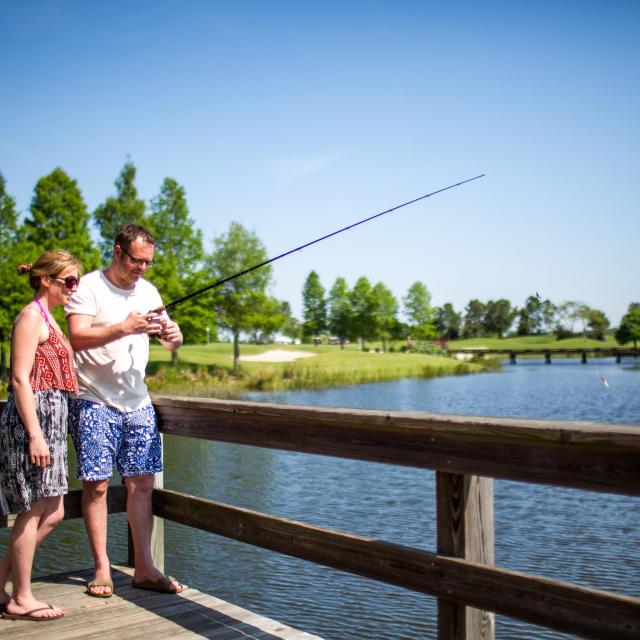 Fishing at Rosen Shingle Creek in Orlando
Fishing at Rosen Shingle Creek in OrlandoOther green hotel initiatives in Orlando include:
- Eighteen hotel brands in Orlando donate unused soap to Clean the World. The non-profit distributes recycled soap products to homeless shelters and impoverished countries.
- Grande Lakes Orlando (including JW Marriott Orlando, Grande Lakes and The Ritz-Carlton Orlando, Grande Lakes) is recognized as a “Certified Audubon Cooperative Sanctuary.” The Audubon Cooperative Sanctuary Program for Golf Courses helps courses preserve and enhance wildlife habitats and protect national resources.
- Hilton Orlando restaurants David’s Club Bar & Grill and Spencer’s for Steaks and Chops have been recognized as Ocean Friendly Restaurants by the Orange County Environmental Protection Division, with both committing to restrict the use of plastic foam, plastic bags and straws.
- Wyndham Lake Buena Vista and Wyndham Garden Lake Buena Vista, both located in the Disney Springs® Resort Area Complex, have recycling bins in guest rooms; opt-in policies for towel replacements; and only change bedding every three days, unless a guest specifically asks.
- Rosen Hotels & Resorts converts its used cooking oil into biodiesel that goes to power their maintenance vehicles and golf course equipment. Their properties include Rosen Shingle Creek, Rosen Centre Hotel, Rosen Plaza Hotel, Rosen Inn International, Rosen Inn Closest to Universal, Rosen Inn at Pointe Orlando, and Rosen Inn Lake Buena Vista.
- Rosen Hotels & Resorts, Hyatt Hotels, Marriott International, Hilton Hotels and Hilton Grand Vacations have all pledged to remove plastic, single-use straws from their facilities.
- Rosen Shingle Creek and Hilton Orlando are founding members of Green Destination Orlando. The two properties are a catalyst for the program’s implementation because of their green practices.
- Walt Disney World Resort hotels replaced individually packaged soaps and shampoos with refillable dispensers to reduce plastic waste.
- Marriott hotels have removed small plastic toiletry bottles.
- IHG hotels replaced all miniature toiletries with bulk-sized amenities.
- Loews Hotels properties practice several green programs including food donations, eco-friendly linen washing policies, back-of-house recycling, and eco-friendly energy tech such as low-flow showerheads and fluorescent lightbulbs.
-
Some of Orlando’s most iconic venues are helping to lead the way to a greener tomorrow.
North/South Building at the Orange County Convention Center in OrlandoOrange County Convention Center
In partnership with the Orlando Utilities Commission, the Orange County Convention Center (OCCC) is committed to sustainability with its “Orange to Green” campaign. The implementation of its one-megawatt rooftop solar photovoltaic (PV) system — the largest one in the southeastern United States — and its recycling efforts helped the OCCC become the first U.S. convention center to receive the EMS (environmental management services) ISO 14001 Certification.
The PV system utilizes high-efficiency flat-plate collectors and occupies approximately 200,000 square feet (60,960 square meters) of roof space on the North/South Building. Other green initiatives include purchasing recycled products, using reclaimed water for landscaping irrigation, installing xeriscape plantings, using Green Seal-certified cleaning products, and installing waterless urinals and low-flow faucets. In addition to its facility-related green initiatives, the OCCC works closely with event organizers to support their efforts for green events.
Amway Center
Part of downtown Orlando’s Parramore District, the Amway Center is the first NBA facility to earn a Leadership in Energy and Environmental Design (LEED) new construction certification from the U.S. Green Building Council. Home to the Orlando Magic, Orlando Solar Bears and Orlando Predators, and host to a wide range of concerts and special events, the venue uses 20% less energy and 40% less water than arenas of similar size.
The Amway Center’s eco-friendly features include preferred parking for hybrids and other energy-efficient vehicles, high-efficiency heating and cooling systems, ultra-low-flow toilets, a reflective and insulated roof that reduces cooling costs, high-tech monitoring systems that shut off the lights when a room is empty, bicycle racks, showers and changing rooms for workers who bike to work, systems to treat storm runoff before it can pollute nearby lakes, and recycling bins for fans and concertgoers.
Orlando Wetlands Park
Located east of Orlando in Christmas, Orlando Wetlands Park is one the largest man-made wetlands in the world. The structure was designed with a hydraulic capacity of 35 million gallons per day of reclaimed wastewater.
The water is transported through a 4-foot diameter pipeline for approximately 17 miles to the influent distribution structure of the wetlands. Seventeen cells and three distinct wetland ecosystems were created to remove residual amounts of nutrients, such as nitrogen and phosphorus, from the reclaimed water.
These ecological communities include deep marsh areas, mixed marsh, wet prairie and hardwood cypress swamps. The site added 2.3 million aquatic plants, including 200,000 trees, to build these thriving environments. The reclaimed water meanders through the various habitats and eventually arrives at the two outfall structures for the wetland system. The flow leaves the Orlando Wetlands Park via a canal and flows into the St. Johns River.
The Student Union at the University of Central Florida (UCF)
UCF’s Student Union has a 1,600-square-foot (1,486-square-meter) Green Roof that provides 43.3% energy savings during the summer. When these roofs launched in 2007, UCF was the second location in all Florida and the first university to implement this technology.
The building’s planted greenery makes an 80-degree difference in the roof’s temperature, extends the life of the roof membrane, and cuts energy costs. It also retains 80% of the average storm water volume, which is then used for irrigation purposes. What’s more, UCF’s physical science building, recreation and wellness center, College of Medicine Medical Education, and Burnett School of Biomedical Sciences are LEED certified.
-
Orlando is at the forefront of testing autonomous vehicles and piloting new projects with businesses headquartered in the region. In 2019, our first driverless shuttle bus was launched, with interest to expand through downtown Orlando and the tourism corridor to help efficiently move people throughout the community. Central Florida was also deemed an autonomous vehicle proving ground by the U.S. Department of Transportation.
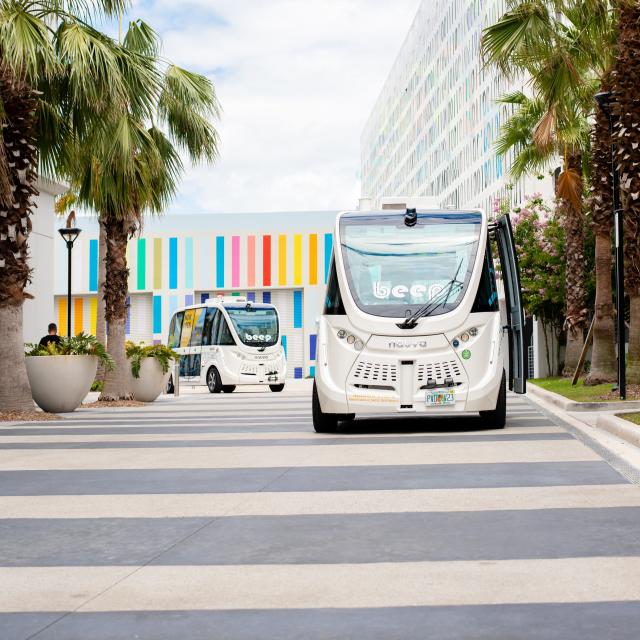 Beep Autonomous Shuttle in Orlando’s Lake Nona Community (Lake Nona Wave Hotel)
Beep Autonomous Shuttle in Orlando’s Lake Nona Community (Lake Nona Wave Hotel)Orange County was awarded a $20 million grant to create Local Alternative Mobility Network (LAMN) in Tavistock Group’s Lake Nona community in the City of Orlando. The BUILD grant is going toward creating new and modifying existing infrastructure in Lake Nona, including multi-modal corridors with autonomous vehicle lanes, bicycle and pedestrian pathways, an integrated and multi-use mobility hub, and support for autonomous vehicles (AV), which have already been deployed as the Beep shuttle service.
Learn more: Lake Nona
Orlando is an ideal place to test autonomous vehicles because it provides a range of weather conditions, it’s home to many tech universities that provide talent, and the state of Florida has favorable regulation for self-driving cars. No wonder we’re home to Luminar, which designs lasers and sensors for self-driving cars to navigate roads. Also of note, the SunTrax test facility is a 2.25-mile track designed to test high-speed travel.
Construction and expansions at Orlando International Airport (MCO) and Port Canaveral, as well as expansions to passenger rail, continue to increase the number of sustainable transportation options in the region.
-
Building a sustainable future is a team effort. Here is how Orlando’s business community is helping us achieve that goal.
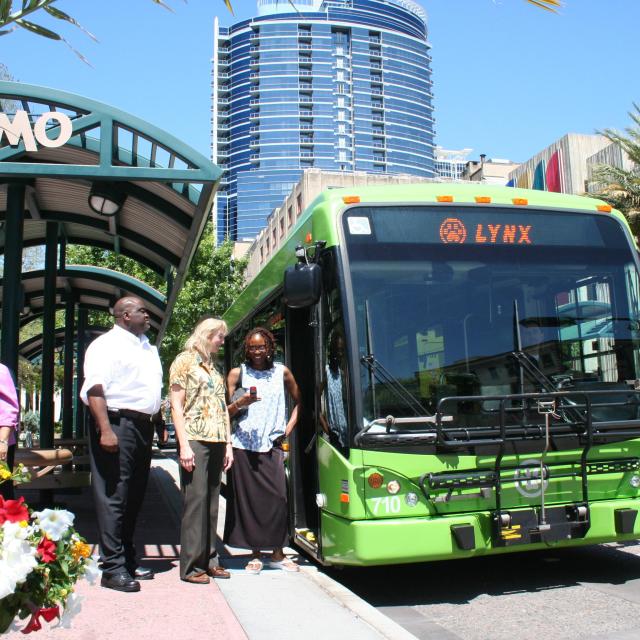 Orlando’s LYNX Public Transportation Services Use Biodiesel Blending
Orlando’s LYNX Public Transportation Services Use Biodiesel Blending- Florida’s first hydrogen energy station is in Orlando. A result of a collaborative effort between the State of Florida, Ford Motor Company, ChevronTexaco and Progress Energy, it fuels eight hydrogen-powered shuttles that transport visitors at Orlando International Airport.
- The Orlando area is home to more than 300 government, academic and corporate entities working on alternative fuels, including the Central Florida Clean Air Team, a group striving to improve air quality in the metropolitan area through initiatives like advocating for the use of alternative fuels.
- Central Florida Regional Transportation Authority, which operates LYNX public-transportation services, became the first transit agency in the nation to produce and implement biodiesel blending for its entire fleet in 2010.
- As part of a Purchase Power Agreement with a solar developer, Orlando Utilities Commission (OUC) established Orange County’s first solar farm at Stanton Energy Center. The 5.9-megawatt solar PV array in east Orange County can generate enough renewable energy to power more than 600 homes. The newer Kenneth P. Ksionek Community Solar Farm operates atop a closed byproduct landfill at a power plant, giving customers access to maintenance-free solar energy without having to install panels on their homes or businesses.
- The Florida Solar Energy Center (FSEC), an internationally acclaimed institute of the University of Central Florida, is the country’s leading renewable energy research center. FSEC researches renewable energy and energy efficiency in partnership with nonprofit organizations, private sponsors and national laboratories. FSEC focuses on solar, thermal and PV systems, as well as hydrogen technologies.
- City of Orlando Fire Department stations 14, 15, 16 and 17 all carry a LEED certification. As well, stations 1 and 7 are LEED Gold Certified for their outstanding commitment to encourage environmentally friendly practices.
- The Indian River Queen, a 260-passenger riverboat that provides day cruises, parties and special events, utilizes the Marine Dragonfly wastewater management system. A vessel using this system becomes self-sufficient with its holding tanks in No Discharge Zones and avoids introducing harsh chemicals into the environment.
- The Sanford Airport Authority and TBI Airport Management Inc. partnered with Energy Systems Group on a 10-year agreement at the Orlando Sanford International Airport (SFB) for energy conservation and facility upgrades. It produces a 35.4% reduction of carbon emissions generated by existing electrical usage, and it reduces water consumption by 982,080 gallons (3,717,577 liters) per year.
- The Downtown Development Board (DDB), in partnership with the Solid Waste Division, launched the Downtown Orlando Commercial Recycling Pilot Program. The goal of this program is to make recycling readily accessible, convenient and manageable for downtown Orlando commercial establishments
- The University of Central Florida manages 800 acres of land, improves storm-water drainage and preserves the habitats of more than 45 animal species. It also converts vegetable oil to biodiesel fuel for on-campus vehicle operations. The university removed trays from its dining halls to decrease food waste by as much as 30%. New construction at UCF is designed to meet the highest LEED standards of efficiency, and a third of the campus energy demand is met using natural gas.
- Rollins College is home to a student-run sustainability program that implements campus-wide initiatives toward a more eco-friendly community. The green programs include efficient lighting, recycling and low-flow shower heads. Additionally, the Rollins Museum of Art gift shop is a fair-trade certified vendor.
- IKEA Orlando is becoming 100% renewable. All wood used is from sustainable sources in countries with a history of challenges related to forest management.
-
Launched in 2007, the Green Works Orlando initiative reflects Mayor Buddy Dyer’s commitment to sustainability and his goals to enhance quality of life and wellbeing, generate diverse economic growth, and create equitable access to resources and services for the entire Orlando community.
 Lake Eola Park in Downtown Orlando (Come Out With Pride Orlando)
Lake Eola Park in Downtown Orlando (Come Out With Pride Orlando)Mayor Dyer assembled the city’s first Office of Sustainability and Resilience to implement the Green Works Orlando initiative by coordinating with city departments and community stakeholders to ensure the effectiveness of immediate and long-term sustainability planning efforts. Some of the earlier successes of Green Works Orlando included the development of a “Sustainability” chapter in the city’s Municipal Code.
The Green Works Municipal Operations Sustainability Action Plan was adopted in 2012 and focused on municipal operation actions that the city and its employees could take to ensure that Orlando is leading by example across each key area of sustainability practices. The 2012 Municipal Plan identified 12 goals and more than 100 strategies for achieving them. In January 2017, the city published a Municipal Plan Progress Report, which detailed the city’s advancements toward its goals and the associated benchmarks, identified areas that need additional resources, and also added a focus on resiliency.
Following the adoption of the Municipal Plan, the city prepared a Community Sustainability Action Plan in 2013 and released the most recent version in 2018. Through an extensive engagement and collaboration process with community representatives, the Community Sustainability Action Plan has served as a roadmap, including ambitious goals, strategies, and reporting targets and metrics, to help guide Orlando to become one of the most sustainable U.S. cities by 2040.
To date, the city has implemented various programs and policies that support residents and businesses in making their homes and communities more sustainable. Highlights include:
Clean Energy
Orlando has begun powering city facilities through onsite solar installations and subscribing over 50 facilities to community solar. These include all city parks and neighborhood centers, 17 fire stations, the Orlando Police Department, and City Hall.
Through the 2030 Solar Pledge, the city is committed to powering its facilities with 100% solar power within the next decade. We have also partnered with Solar United Neighbors (SUN) to offer an annual purchasing cooperative to make it easy and more affordable for residents to go solar.
As a result of these efforts, Orlando was recognized for achieving the LEED for Cities Gold certification for its citywide sustainability and resiliency efforts, the highest level of performance for any city in the Southeast United States, as well as an EPA Green Power Partner for its growing use of renewable energy.
Green Buildings
Our city was approved for a $17.5 million green bond to implement energy efficiency retrofits to 55 city buildings, which saves over 23% energy use and up to $2.5 million per year. Orlando also enabled more than $500 million for Property Assessed Clean Energy (PACE), an innovative program that provides financing for energy efficiency upgrades and solar installations.
We’re proud to be the first city in Florida to pass a Building Energy and Water Efficiency Strategy (BEWES) ordinance to drive energy and water efficiency in the city’s largest buildings. And we’ve committed to meeting Leadership in Energy and Environmental Design (LEED) Silver or higher standards for all newly constructed city buildings.
Local Food
Orlando created the Good Food Central Florida Food Policy Council to address gaps in the current local food system. We’ve increased food assets, including six farmers markets, 149 grocery stores and more than 700 community garden plots within the city limits.
Recent landscape code amendments have enabled front-yard farming and edible landscaping, while urban agriculture pilot programs on public land model sustainable food production. We’ve even established an urban chicken policy that allows up to four hens to be kept on single-family residence sites.
In response to the COVID-19 pandemic, Orlando also implemented food rescue and recovery efforts, with more than 25,000 pounds of food donated to local charities and shelters.
Livability
Continually expanding, the Orlando Main Streets program supports local businesses while increasing economic vitality, including a new Parramore Main Street. Others include the Audubon Park Garden District, City District, College Park Main Street, Curry Ford West, Gateway Orlando, Ivanhoe Village Main Street, The Milk District, Mills 50 District, SoDo District, Thornton Park District and West Lakes District.
Learn more: Orlando Neighborhoods
Our One Person, One Tree initiative has provided over 12,000 free trees to residents in order to increase the city’s overall tree canopy. We’ve also expanded the amount of green space and park space within diverse neighborhoods, and have been recognized by the National Wildlife Federation (NWF) as a certified wildlife habitat community.
Zero Waste
Orlando has implemented a residential composter program that has delivered more than 7,000 composters to help residents divert their food waste and create healthy soil. We’ve also deployed monitored and unmonitored food waste drop-offs for residents.
Simultaneously, the city has shifted to once-a-week collection of recycling and expanded recycling bins in downtown Orlando and public parks to increase participation and overall residential recycling rates. That’s on top of the “Orlando Collects” mobile app and “What Goes Where” online tool to share information and educate residents on how to properly dispose of items.
Transportation
With a goal of providing safe, comfortable and convenient access for all users, Orlando has adopted a Complete Streets policy. As part of that initiative, we’ve expanded bicycling infrastructure with a total of 250.5 miles of on-street bike lanes and 36.2 off-street bike trails.
Orlando has also implemented electric bike and scooter share programs that resulted in 1,241,609 trips for a total of 1,293,383 miles between January 2020 and January 2022. We’ve partnered with LYNX to convert LYMMO downtown circulator fleet vehicles to zero-emission electric buses, with eight buses in operation currently.
You will also find more than 100 new electric vehicle charging stations in city parks, neighborhood centers, parking garages and public venues. And we’re committed to converting 100% of the city fleet to electric or alternative-fueled vehicles by 2030.
Water
Orlando is taking steps to conserve water, including decreasing average water consumption by 9 million gallons per resident per day. We’ve also installed 25 hydration stations near public parks to reduce disposable bottled water use, and have recycled 15,000 gallons of used cooking oil into biodiesel.
-
In Orlando, sustainability isn’t just a buzzword. It’s an ideal we’re deeply committed to, as evidenced by these pacts with external stakeholders.
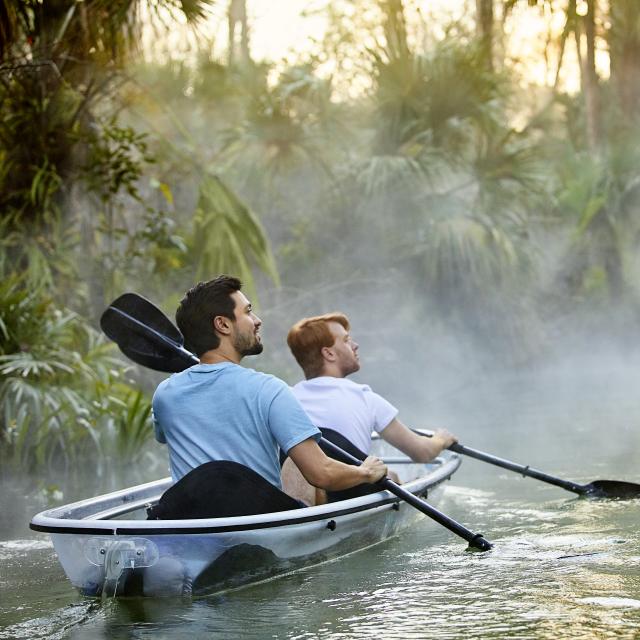 Sustainability Commitments Help Support Orlando Ecotourism
Sustainability Commitments Help Support Orlando Ecotourism- US DOE Better Buildings Challenge: 20% reduction of energy use in city buildings by 2021.
- Energy Secure Cities Coalition: Transition city fleet and public transit vehicles to 100% electric and alternative fuels by 2030.
- Ready for 100: Transition city electric grid to 100% renewable energy for municipal ops (2030) and city-wide (2050).
- Global Compact of Mayors for Climate & Energy: Commitment to measure, track and reduce our greenhouse gas emissions in alignment with the Paris Climate Agreement.
- Under2 MOU / We Are Still In / America Is All In: Official sub-national agreement commits to aligning with the Paris Climate Agreement of reducing greenhouse gas emissions.
- Climate Emergency Declaration: Official recognition of the climate crisis as an emergency.
- Beyond 34 Initiative: Commitment to move to zero waste community by 2040.
- Building Energy & Water Efficiency Strategy (BEWES): Commitment to measure and track the energy and water performance of city buildings annually.
- Clean Energy for Low-Income Communities Accelerator (CELICA): Working to develop action plan to increase the adoption of clean energy in low-income communities.
- NWF Wildlife Habitat Certification: Create or restore wildlife habitat in the community and do education and outreach.
- Mayor’s Monarch Pledge: Committing to both restore habitat in the community and encourage citizens to do the same.
- Cities With Nature: A partnership with TNC and ICLEI to begin addressing the natural and built environments.
- Net-Zero Carbon by 2050: OUC’s announcement of the EIRP underscores our goal to achieve net-zero carbon emissions citywide by 2050.
- 100% Electric Lymmo Bus System by 2025: In collaboration with OUC and LYNX, the city has committed to transitioning the downtown Lymmo BRT to 100% zero-emission electric by 2025.
- Race to Zero: An evolution to our Under2 MOU, Ready for 100, GCoM, ICLEI, CDP and other climate commitments. Ultimate goal is getting to zero carbon economy by 2050.
- ICLEI150 Leadership: Cohort of leading cities around the world working to Race to Zero by 2050.
- US DOE BBC Low-Carbon Pilot: Developing net-zero energy/carbon technical specs using two city buildings.
-
See the many sustainability accolades and endowments Orlando has received since 2014. As always with our destination, the best is yet to come.
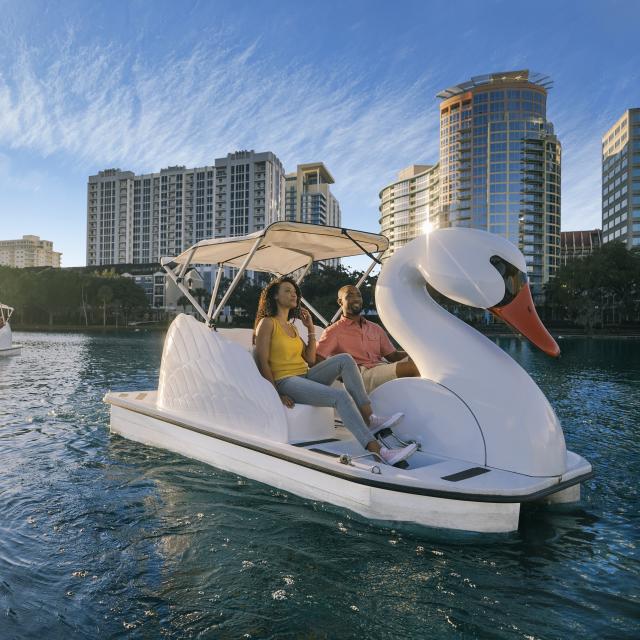 Green Efforts Help Ensure That Orlando Will Always Be The City Beautiful (Lake Eola Park Pictured)
Green Efforts Help Ensure That Orlando Will Always Be The City Beautiful (Lake Eola Park Pictured)2022
- Top ENERGY STAR City by US EPA
- ACEEE Top 25 Clean Energy Ranking for Top 100 U.S. Cities
- McQuigg Urban Farm Grants From Bank of America, Central Florida Found, FDACS
- UN Foundation Spotlight on Orlando Leadership to Advance SDGs
- USCM Childhood Obesity Prevention & Environmental Health & Sustainability Awards
- Catalyst2030 SDG Award
2021
- Top Earth-Friendliest City in the U.S. — Parade Magazine
- Greenest City in Florida, Insurify
- $2.85 Million CDBG Grant for 6 Resilience Hubs
- Daring Cities Report, Orlando Spotlight
- Department of Energy Better Buildings Goal Achiever
2020
- Gardening Know How Grant
- NRDC Food Matters Grant
- Florida Bev Association “ReThink Your Waste” Grant
- RTF Zero Waste Award, Education
- RTF Zero Waste Award, Innovation
- Golden Brick Award — Food Waste Drop-Off Program
- EPEAT Purchaser Award from GEC
- Solar Leader Award From The Solar Foundation, Shining Cities Report
- ACEEE Top 25 Clean Energy Ranking for Top 100 U.S. Cities
- U.S. Composting Council “Outstanding Organics Diversion Program”
2019
- Best Municipal Green Program, Green Builder Media
- America’s Cities Climate Challenge (ACCC) Grant Winner, Bloomberg Philanthropies
- USGBC LEED For Cities & Communities Award Winner, and GOLD Certified 2019
- National Wildlife Federation (NWF) Community Wildlife Habitat Certification
- Audubon Florida’s Guy Bradley Award
- Golden Brick Award, Bike and Scooter Micromobility Program
- The Recycling Partnership (TRP) Multifamily Recycling Grant
- ACEEE City Scorecard ranked No. 15 in USA and Best in the Southeast
- USGBC “LEED For Cities” GOLD v4.1 Certified
- PETA Ranks Orlando as Top 10 Best Cities for Vegan Diets
2018
- SolSmart Gold Certified City, Solar Foundation / US Department of Energy
- US EPA Southern Diesel Collaborative — Visionary of the Year
- America’s Greenest Cities Report, #28, and Best in the Southeast — Wallethub
- emPOWER Government Leader award, Clean Energy Leadership Institute (CeLI)
2017
- U.S. Green Building Council LEEDership Award (2015, 2016 & 2017)
- U.S. Green Building Council Outstanding Community LEEDer
- Arbor Day "Tree City USA" (2nd Oldest City in the U.S.)
- ACEEE Top 20 clean energy ranking for Top 75 U.S. Cities
- Outstanding Urban Tree Canopy Program — Florida Urban Forestry Council
- Best Practices in Partnership Development, Commercial Food Waste Collection — Sustainable Florida
2016
- USDA Farmers Market Promotion Program Grant
- Top 10 EV Ready Cities in the United States — WalletHub
- Top 10 Best Cities for Urban Farming, Redfin
2015
- Solar America City, U.S. Department of Energy
- Florida Green Building Coalition (FGBC) Gold Certified City
2014
- City Energy Project Grant, NRDC/IMT



